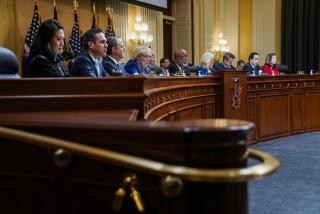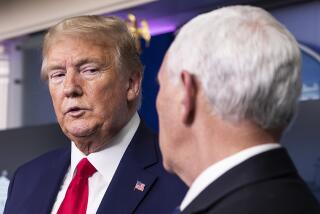U.S. Plan a Well-Kept Secret Until TV Briefing
- Share via
WASHINGTON — Until Sen. Claiborne Pell (D-R.I.) advised congressional reporters at twilight Monday to expect President Reagan to go on television later in the evening, the fact that the chief executive had reached a firm decision on how to deal with Libyan-sponsored terrorism was muffled in secrecy.
Pell, ranking Democrat on the Senate Foreign Relations Committee, was among the congressional leaders invited to an afternoon meeting in the Executive Office Building adjoining the White House to discuss Reagan’s decision. Reporters could only assume that it dealt with Libya, but Reagan’s decision remained secret to all but insiders until White House spokesman Larry Speakes went public at a televised briefing at 7:20 p.m. EST (4:20 p.m. Pacific time).
Speakes began Monday’s first meeting with reporters with a declaration that he would have “no comment at all” on questions involving Libya. He stuck with that through a barrage of questions, not even admitting the accuracy of widespread reports that Reagan planned to hold an afternoon meeting on the Libya situation. Press officers at the State Department and Pentagon were equally uncommunicative.
A hint that a decision was imminent came shortly after noon at a ceremony in the White House Rose Garden, where Reagan bade farewell to Japanese Prime Minister Yasuhiro Nakasone. As the President headed back to his office, a reporter shouted a question as to when there would be a decision on how to deal with Libyan strongman Moammar Kadafi.
“Not now,” Reagan replied and strode into his office.
A government briefer who asked not to be identified said later that the President and the Japanese leader had discussed terrorism as “a terrible problem that had to be dealt with” but reached no specific conclusions.
At 4:10 p.m., reporters saw Reagan, accompanied by about a dozen aides including White House Chief of Staff Donald T. Regan, cross the private street that separates the office wing of the White House from the Executive Office Building. Fifty minutes later, as the President returned to his office for a scheduled ceremony, a reporter shouted, “What are you going to do about Kadafi?”
“Just wait,” the President replied. “Be patient.”
The facade of secrecy began to crack at 6:30 p.m., when Reagan failed to join a motorcade that was supposed to escort him to a dinner with his friend, Sen. Paul Laxalt (R-Nev.). Minutes later, Pell leaked word of the television talk, setting off a spate of rumors that swamped phones to the White House press room.
Administration officials attending the session in the Executive Office Building, in addition to the President and Regan, included Vice President George Bush, Secretary of State George P. Shultz, Defense Secretary Caspar W. Weinberger, CIA Director William J. Casey, national security adviser John M. Poindexter and Adm. William J. Crowe, chairman of the Joint Chiefs of Staff.
In the congressional group were Sens. Bob Dole (R-Kans.), majority leader of the Senate; Robert C. Byrd (D-W.Va.), Senate minority leader; Richard G. Lugar (R-Ind.), chairman of the Senate Foreign Relations Committee, and Pell, the ranking member. Others were Sam Nunn (D-Ga.), ranking minority member of the Senate Armed Services Committee, and Reps. Robert H. Michel (R-Ill.) minority leader of the House, and Dante B. Fascell (D-Fla.) and William S. Broomfield (R-Ill.), respectively chairman and ranking member of the House Armed Services Committee.
More to Read
Get the L.A. Times Politics newsletter
Deeply reported insights into legislation, politics and policy from Sacramento, Washington and beyond. In your inbox twice per week.
You may occasionally receive promotional content from the Los Angeles Times.








